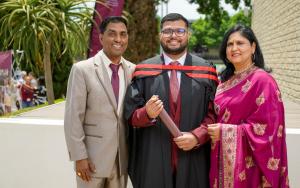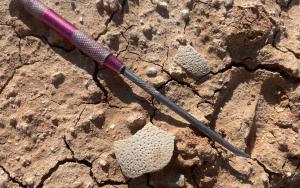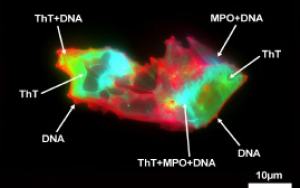
New centre to advance drug discovery to address Africa’s healthcare needs
- The Africa Centre for Therapeutic Innovation (ACTI) will fill a critical gap in South Africa and Africa’s drug discovery capabilities.
- The new centre will have a strong focus on interdisciplinary research with contributions from chemistry, biology, and pharmacology, thereby further strengthening the university’s position in the health innovation space.
Stellenbosch University (SU) has launched a new transdisciplinary centre to advance drug discovery and therapeutic innovation to address Africa’s unique healthcare challenges.
The Africa Centre for Therapeutics Innovation (ACTI) brings together contributions from the broad disciplines of chemistry, biology, pharmacology, thereby further strengthening the university’s position in the health innovation space.
Although based in SU’s Department of Biochemistry, the centre’s members are from several faculties and schools, emphasizing its strong focus on interdisciplinary research.
Prof Erick Strauss, co-director of the new centre, says ACTI provides a strategic vehicle to advance drug discovery and therapeutics innovation from a biology perspective.
“To translate drug discovery research to health innovations requires a multidisciplinary approach, with inputs from stakeholders in various knowledge areas,” he said ahead of the launch of the centre at STIAS on Wednesday, 15 October.
“With a strong focus on disease biology and mechanistic knowledge underpinning therapeutics innovation, ACTI fills a critical gap in drug discovery capabilities in South Africa and Africa, and complement other regional activities,” he added.
For example, he is currently leading a project team that is trying to develop new anti-tuberculosis agents that work by causing the tuberculosis bacterium to destroy its own essential proteins. “This requires us to develop new laboratory methods that would allow us to determine how successful we are in getting this right”, says Strauss.
According to Prof Lyn-Marié Birkholtz, ACTI co-director, ACTI will support such studies by specifically focusing on delivering the much-needed mechanistic understanding of drug action, with strong support from experimental and mathematical disease translational models.
“Without this information, the value chain in delivering clinical drug candidates remains incomplete,” she explained. This is especially true in anti-malaria research. Though many drugs with good antimalarial activity can be identified, we still need to figure out how they act and whether the malaria parasite could become resistant. These are the kinds of studies that ACTI will pursue.
ACTI is currently part of several networks supporting drug discovery in Africa – such as the RAFIKI Project and GC ADDA (Global Challenges Accelerating African Drug Discovery Solutions) – and collaborates with research groups and institutes across the world, including H3D (the Drug Discovery and Development Centre at the University of Cape Town).
In 2024, Profs Strauss and Birkholtz were recipients of major grants to accelerate drug discovery in tuberculosis (TB) and malaria. “These awards laid the foundation on which ACTI was built”, said Strauss. “By partnering with more colleagues at SU, we are excited about ACTI’s prospects in finding solutions to many of the pressing healthcare needs in Africa.”
The deans of the Faculties of Science and Medicine and Health Sciences (FHMS) attended the launch, as well as the Director of the School for Data Science, Prof Kanshu Rajaratnam, and the Vice-Chancellor for Research, Innovation and Postgraduate Studies, Prof Sibusiso Moyo.
Prof Elmie Muller from FMHS said it was exciting to see people with a similar vision and energy in the same room excitement in the room: “At FMHS, we are following a more open-minded approach to patient care, and I’m excited to see such a way of thinking here with the establishment of ACTI.”
Prof Burtram Fielding from the Faculty of Science said ACTI will be an important vehicle to promote cooperation across, departments, faculties and partners: “ACTI is the glue that will bring all these parties together,” he added.
Prof Moyo also emphasized the importance of all these disciplines and parties coming together in this part of the world: “It is critical for SU and the region to establish entities that can address the continent’s challenges,” she concluded.
Several of ACTI’s partners also welcomed its establishment.
Dr Nireshni Chellan, senior scientist at the Biomedical Research and Innovation Platform of the South African Medical Research Council (MRC), welcomed this “forward thinking initiative” and the importance of sharing insights in the space of therapeutic innovation.
Other speakers were Prof Roland van Rensberg from FHMS’ Clinical Pharmacology Division, Prof Andrew Whitelaw from FHMS’ Medical Microbiology Division, Prof Ben Loos from the Department of Physiological Sciences in the Faculty of Science, and Dr Dirk Lamprecht from the Drug Discovery and Development Hub at the University of Cape Town.



